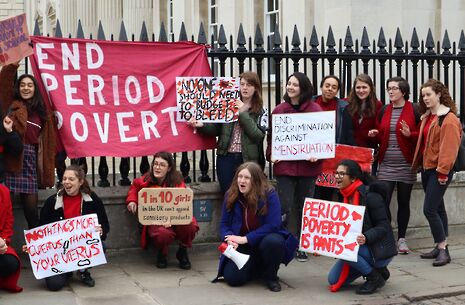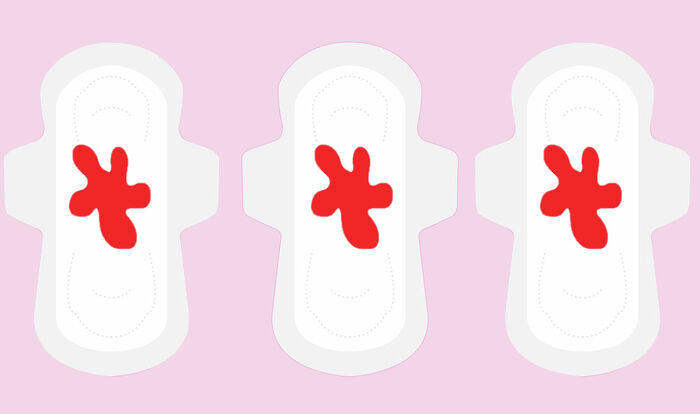Students rally against period poverty on International Women’s Day
The ‘Rally in Red’, organised by Oxfam Cambridge University, saw protestors dressing in red to call for an end to period poverty and greater accessibility to sanitary products

Despite the gloomy weather, more than 50 people gathered for the ‘Rally in Red’ outside of Great St. Mary’s Church yesterday at 3pm, with many wearing red to call for an end to period poverty and greater accessibility to sanitary products.
The demonstration, organised by Oxfam Cambridge University, featured a variety of speeches, chants and a dance performance that persevered despite several technical difficulties.
Chants such as “Hey, ho, period poverty has got to go!” echoed throughout King’s Parade. The demonstrators also carried posters with slogans such as “no one should need a budget to bleed” and various related puns like “bloody outrage” or “nothing more cuterus than your uterus”.
One of the speakers at the rally included King’s College Femsoc President, Cato van Schaik, who called for an end to the stigma surrounding periods in research. Schaik accused academia as often treating menstruating women as “volatile factors, not worth studying”, causing menstruation to be perceived as “a disease to be eradicated”. She also called on institutions to not only consider period poverty on public policy grounds but to actively question persisting practices.
Speaking to Varsity, Thea Augustidis, one of the organisers and a representative of Oxfam Cambridge University, stated that the demonstration had three core objectives: to break stigma surrounding female menstruation, to campaign for free menstrual products and to end period poverty. Augstidis stated that it is “not really fair that toilet paper gets provided for free” while female sanitation products are harder to acquire. She also pointed out that inaccessibility to basic means of female sanitation is an issue which disproportionately affects the poor.
In a comment to Varsity, Emma McAuliffe, another Oxfam Cambridge University representative and rally organiser, expressed her concern that period products are charged as a luxury item. Within the University, McAuliffe stated the need for the University to take initiative in making female sanitary products available and free for “everyone, everywhere in every college.” Augstidis also pointed out that there are wealth disparities between college which may impact whether they have products available or not but that, regardless, most colleges are able to provide free condoms.
Last month, CUSU council voted to support the provision of sanitary products at colleges and departments, a motion proposed by Fitzwilliam JCR president Ellie Brain, whose petition calling on Cambridgeshire County Council to provide free sanitary products in all public facilities reached over 2,000 signatures.
Melissa, a student attending the demonstration, emphasised the need for increased awareness on how the University can impact the issue itself.
The rally is part of a longer running campaign against period poverty organised by Oxfam Cambridge University. This term, the organisation has worked with the ADC Theatre to put on a series of feminist plays in order to fundraise for the cause. Oxfam Cambridge University has also also organised a panel discussion with Amika George, the young activist who started the #freeperiods campaign against period poverty. Next term, Oxfam Cambridge University will also host an exhibition featuring a variety of “period art”.
Munira Rajkotwalla, secretary of Oxfam Cambridge University said to Varsity: “Menstruation isn’t a choice. It’s a reality. Our campaign throughout this term has sought to emphasise this and work towards eliminating period poverty on a global, national and local level.”
In March 2018, the British government allocated £15 million for the “Tampon Tax Fund” to fund projects surrounding the issue of period poverty and other issues related to female health and wellbeing. However, as period products are still considered a “luxury item” they are taxed with 5% VAT – according to Plan International UK 1 in 10 girls in the UK cannot afford menstrual products. Worldwide over 1.2 billion lack access to hygiene and sanitation, , according to the Office of the High Commissioner of Human Rights, with the UN deeming menstrual hygiene a “human rights issue”.
Correction Saturday 9 March 14.43: this article was updated to clarify that Oxfam Cambridge University, rather than Oxfam Cambridge, organised the rally.
 Comment / Plastic pubs: the problem with Cambridge alehouses 5 January 2026
Comment / Plastic pubs: the problem with Cambridge alehouses 5 January 2026 News / New movement ‘Cambridge is Chopped’ launched to fight against hate crime7 January 2026
News / New movement ‘Cambridge is Chopped’ launched to fight against hate crime7 January 2026 News / Uni-linked firms rank among Cambridgeshire’s largest7 January 2026
News / Uni-linked firms rank among Cambridgeshire’s largest7 January 2026 News / SU stops offering student discounts8 January 2026
News / SU stops offering student discounts8 January 2026 News / Cambridge businesses concerned infrastructure delays will hurt growth5 January 2026
News / Cambridge businesses concerned infrastructure delays will hurt growth5 January 2026









